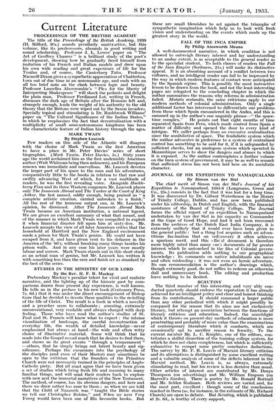FALL OF THE INCA EMPIRE By Philip Ainsworth Means A
well-documented narrative, in which erudition is not allowed to outweigh literary interest and lay understanding to an undue extent, is as acceptable to the general reader as to the specialist student. To both classes of readers the Fall of the Inca Empire (Scribners, 218.) will make its distinctive appeal. It is an absorbing account of a conflict between two cultures, and no intelligent reader can fail to be impressed by the way in which modern features of contact were anticipated by the Spanish regime. This is possibly the most instructive lesson to be drawn from the book, and not the least interesting pages are relegated to the concluding chapter in which the author summarizes the reasons why reforms in administration failed. Mittatis mutandis, the same criticisms apply to our modern methods of colonial administration. Only a single additional factor has intervened to differentiate our problems from those which Spain encountered in the Andes, and this is summed up in the author's one ungainly phrase—" the space- time complex." He points out that eight months of time separated Spain from Peru, which made control from Spain a matter of difficulty and opened the door to every kind of intrigue. We suffer perhaps from an excessive centralization since the annihilation of space. The feudalistic system which the author advocates in preference to a system of centralized control has something to be said for it, if it is safeguarded by sufficient checks, but an analogous system which operated in
Mozambique serves to show the dangers and abuses to which it is exposed. As the author contemplates a further -volume on the Inca system of government, it may be as well to remark that sufficient stress has not been laid here on its socialistic character.




































 Previous page
Previous page